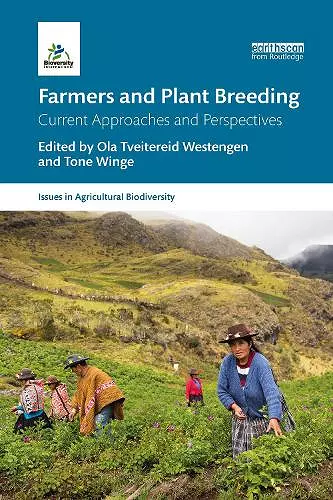Farmers and Plant Breeding
Current Approaches and Perspectives
Ola Tveitereid Westengen editor Tone Winge editor
Format:Paperback
Publisher:Taylor & Francis Ltd
Published:30th Jun '21
Currently unavailable, and unfortunately no date known when it will be back
This paperback is available in another edition too:
- Hardback£145.00(9781138580428)

This book presents the history of, and current approaches to, farmer-breeder collaboration in plant breeding, situating this work in the context of sustainable food systems, as well as national and international policy and law regimes.
Plant breeding is essential to food production, climate-change adaptation and sustainable development. This book brings together experienced practitioners and researchers involved in collaborative breeding programmes across a diversity of crops and agro-ecologies around the world. Case studies include collaborative sorghum and pearl millet breeding for water-stressed environments in West Africa, participatory rice breeding for intensive rice farming in the Mekong Delta, and evolutionary participatory quinoa breeding for organic agriculture in North America. While outlining the challenges, the volume also highlights the positive impacts, such as yield increases, farmers’ empowerment in the innovation and development processes, contributions to maintenance of crop genetic diversity and adaptation to climate change. This collection offers a range of perspectives on enabling conditions for farmer–breeder collaboration in plant breeding in relation to biodiversity agreements such as the Plant Treaty, trade agreements and related intellectual property rights (IPR) regimes, and national seed policies and laws.
Relevant to a wide audience, including practitioners with experience in plant breeding and management of crop genetic resources and those with a broader interest in agriculture and development, as well as students of international cooperation and development, this volume is a timely addition to the literature.
"Engaging farmers and their families in all stages of the global effort to make agricultural systems more sustainable and productive is a vital prerequisite to success. This timely and remarkable book focuses on collaborations between farmers and plant breeders across all types of agroecosystems, and offers real hope for widespread redesign and transformation." - Jules Pretty, University of Essex, UK
"Addressing the Grand Challenges faced by agriculture under a global changing climate requires a highly client-oriented, participatory research-for-development approach. This book provides insights on, and lessons learnt from ‘citizen science’ for both decentralized plant breeding and on-farm variety testing. It further shows how genetic diversity may remain in agro-ecosystems by involving the farming community in crop betterment and deployment. This publication also highlights the hurdles to overcome when pursuing participatory plant breeding. Its analytical and clearly written text along with the examples given by various authors in each chapter demonstrates the advantages of this citizen science approach for variety replacement elsewhere."- Rodomiro Ortiz, Swedish University of Agricultural Sciences, Sweden
"This book will be of interest not only to researchers working directly on crop improvement, but also to policy makers and other professionals involved in food and nutritional security. The authors amalgamate knowledge from decades of farmers’ participation in plant breeding, as a major component of improving various crops around the world. For generations, farmers have been advancing their varieties through on-farm mass selections while also conserving seeds. Therefore, it is highly prudent to enhance the partnership between farmers and plant breeders. The publication contributes to this goal by providing insight into approaches, concerns, new perspectives and legal contexts for effective farmer-breeder collaborations." - Segenet Kelemu, International Centre of Insect Physiology and Ecology, Kenya
ISBN: 9781032088877
Dimensions: unknown
Weight: 494g
354 pages